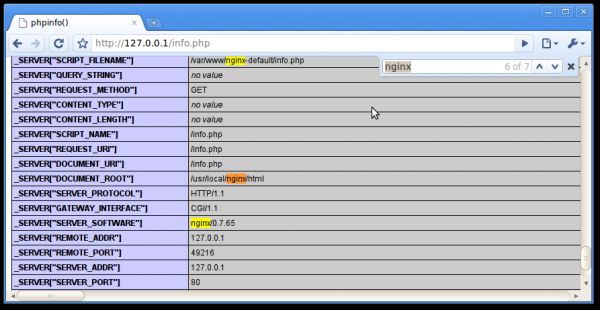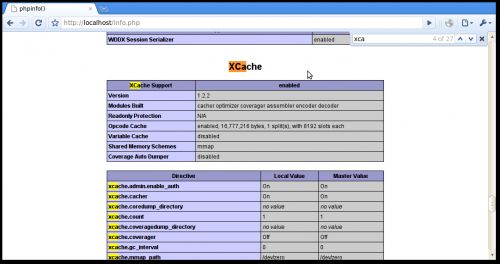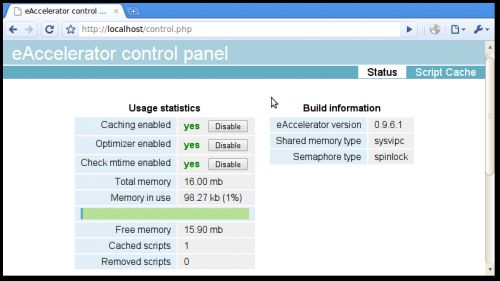安装nginx
sudo apt-get install nginx
Ubuntu安装之后的文件结构大致为:
- 所有的配置文件都在/etc/nginx下,并且每个虚拟主机已经安排在了/etc/nginx/sites-available下
- 程序文件在/usr/sbin/nginx
- 日志放在了/var/log/nginx中
- 并已经在/etc/init.d/下创建了启动脚本nginx
- 默认的虚拟主机的目录设置在了/var/www/nginx-default (有的版本 默认的虚拟主机的目录设置在了/var/www, 请参考/etc/nginx/sites-available里的配置)
启动nginx
sudo /etc/init.d/nginx start
然后就可以访问了,http://localhost/ , 一切正常!如果不能访问,先不要继续,看看是什么原因,解决之后再继续。 启动时候若显示端口80被占用: Starting nginx: [emerg]: bind() to 0.0.0.0:80 failed (98: Address already in use) 修改文件:/etc/nginx/sites-available/default,去掉 listen 前面的 # 号 , # 号在该文件里是注释的意思 , 并且把 listen 后面的 80 端口号改为自己的端口,访问是需要添加端口号。
(安装完后如出现403错误,那可能是nginx配置文件里的网站路径不正确)
配置php和mysql
安装php和MySQL:
sudo apt-get install php5-cli php5-cgi mysql-server php5-mysql
安装FastCgi
/usr/bin/spawn-fcgi这个文件来管理 FastCgi,它原属于lighttpd这个包里面,但 9.10 后,spawn-fcgi 被分离出来单独成包:
sudo apt-get install spawn-fcgi
配置 nginx
修改nginx的配置文件:/etc/nginx/sites-available/default 修改主机名:
server_name localhost;
修改index的一行修改为:
index index.php index.html index.htm;
去掉下面部分的注释用于支持 php 脚本:
location ~ \.php$ {
include /etc/nginx/fastcgi_params; #需放在第一行,否则会出错
fastcgi_pass 127.0.0.1:9000;
fastcgi_index index.php;
fastcgi_param SCRIPT_FILENAME /var/www/nginx-default$fastcgi_script_name;
}
重新启动nginx:
/etc/init.d/nginx stop /etc/init.d/nginx start
启动fastcgi php:
spawn-fcgi -a 127.0.0.1 -p 9000 -C 10 -u www-data -f /usr/bin/php-cgi
为了让php-cgi开机自启动: Ubuntu开机之后会执行/etc/rc.local文件中的脚本 所以我们可以直接在/etc/rc.local中添加启动脚本。 spawn-fcgi -a 127.0.0.1 -p 9000 -C 10 -u www-data -f /usr/bin/php-cgi 添加到语句:exit 0 前面才行
创建、测试phpinfo:
sudo vi /var/www/nginx-default/info.php
<?php phpinfo(); ?>
打开 http://localhost/info.php 。
安装nginx +uwsgi+ Django
这次采用 uwsgi 1.2+django1.4+nginx1.1.19+ubuntu12.04组合进行安装
首先注意 要安装比较新的软件 如果你是ubuntu11.04和11.10 因为内核不同 所以安装软件版本不同
1.首先 安装nginx: sudo apt-get install nginx 2.然后: 进行uwsgi的安装之前 要安装其他几个: sudo apt-get install mysql-server libxml2 libxml2-dev python-dev libpcre3 libpcre3-dev python-MySQLdb 3.进行uwsgi的安装: 可能由于软件版本不够新吧 ppa里头安装后出现502错误 所以 用软件包安装:
- wget http://projects.unbit.it/downloads/uwsgi-1.2.tar.gz
- tar zxvf uwsgi-1.2.tar.gz
- cd uwsgi-1.2
- make
- cp uwsgi /usr/bin
注:如果在MAKE 过程中出现如:(Python.h:没有那个文件或目录)
#解决方法: sudo apt-get install python-dev
4.安装django 之前我用ubuntu源安装.由于admin管理的静态问题.所以我还是改用下载安装比较好. google下django 然后进入下载 https://www.djangoproject.com/download/ 用chrome下载默认/home/helios/下载 然后cd 然后cd 下载 接着 tar xzvf Django-1.4.tar.gz cd Django-1.4 sudo python setup.py install 这是最新版本.copy官网的安装方法. 接着 sudo cp django/bin/django-admin.py /usr/bin/ 接下来 sudo mv /usr/bin/django-admin.py /usr/bin/django-admin 这是为了和源安装在操作上保持一致 但是不知道有没有问题.暂时没有发现问题.有问题大家可以上来补教程. 可以了. 安装好了.
建立项目------------------------
1.cd 2.django-admin startproject mysite
|-mysite |--mysite,manage.py |---__init__.py ,settings.py, urls.py
现在 就是刚刚说的admin静态文件的问题. 我现在把刚刚下载的django安装包的解压文件夹里头 /home/helios/下载/Django-1.4/django/contrib/admin下static文件夹直接复制到mysite下
这样保持localhost/admin可以出现正常页面不再是没有样式的了.
另一种解决admin静态方法问题--------
sudo chmod -R 777 文件夹路径.这个是给予文件夹下所有子文件子文件夹权限.
那么可以从源安装django了 sudo apt-get install python-django 然后 mkdir /home/helios/mysite/static/admin cp -rf /usr/lib/python2.7/dist-packages/django/contrib/admin/media /home/helios/mysite/static/admin sudo chmod -R 777 /home/helios/mysite/static/admin 这样就ok了
配置 nginx uwsgi django
交代下环境:
我的电脑用户名:helios;
#sudo vim /etc/nginx/sites-available/default
出现nginx代码:(序列号不要抄)
listen 80;
root /home/helios/mysite;
server_name youdomain.com#域名 或者当地localhost;
location / {
uwsgi_pass 127.0.0.1:9000;
include uwsgi_params;
access_log off;
}
location /static/ {
alias /home/helios/mysite/static;
autoindex on;
allow 127.0.0.1;
deny all;
}
location /static/admin/ {
alias /home/helios/mysite/static/admin;
autoindex on;
allow 127.0.0.1;
deny all;
}
location ~ ^.+\.(gif|jpg|png|ico|jpeg)$ {
expires 3d;
}
location ~ ^.+\.(css|js)$ {
expires 12h;
}
然后
#vim /etc/nginx/nginx.conf
user helios; 把所有gzip开头的前面#号都去掉,除了Gzip setting
现在 把nginx配置都配好了
uwsgi配置
#cd /home/helios/mysite #vim wsgi.py
写上
import os
import sys from django.core.handlers.wsgi
import WSGIHandler
sys.path.append("/home/helios/mysite")
os.environ["DJANGO_SETTINGS_MODULE"] = "mysite.settings"
application = WSGIHandler()
完了以后
#vim wsgi.xml
写上
<uwsgi> <socket>127.0.0.1:9000</socket> <listen>80</listen> <master>true</master> <pidfile>/var/run/nginx.pid</pidfile> <processes>8</processes> <pythonpath>/home/helios/mysite</pythonpath> <pythonpath>/home/helios/</pythonpath> <module>wsgi</module> <profiler>true</profiler> <memory-report>true</memory-report> <enable-threads>true</enable-threads> <logdate>true</logdate> #这个是程序占用大小,不能太小,太大暂时还不知道 #在测试过程中,我的电脑300以下目测不行。 #也可以删除这段,因为在测试过程中,如果这段设置太小 #会出现问题libgcc_s.so.1 must be installed for pthread_cancel to work #只有在 ubuntu 12.04测试过,其他系统还不清楚 #为了不容易出错可以删掉,但是这个提示给有需要的朋友 <limit-as>300</limit-as> #自己建立文件夹 然后创建空文件django.log这个灵活的 <daemonize>/home/helios/mysite/log/django.log</daemonize> </uwsgi>
配置django
刚刚配置nginx里头有看到这两段把:
location /static/ {
root /home/helios/mysite;
access_log off;
} location /static/admin/ {
root /home/helios/mysite/static;
access_log off;
}
好了 现在终端:
- cd /home/helios/mysite
- vim settings.py
看到 ADMIN_MEDIA_PREFIX STATIC_URL 这两个参数 就是指向这里 如果还有问题 我的参数不是这俩 另外的 你可以参考: MEDIA_ROOT = '/home/helios/mysite/static' MEDIA_URL = '/static/' ADMIN_MEDIA_PREFIX = '/static/admin/' 然后 数据库问题: 我的是mysql数据库: 终端
- cd /home/helios/mysite
- mysql -h localhost -u root -p
Enter password****** >create database mysite default character set utf8;(因为要记录中文 所以默认utf8) >quit
- vim settings.py
DATABASES = {
'default': {
'ENGINE': 'django.db.backends.mysql', # Add 'postgresql_psycopg2', 'postgresql', 'mysql', 'sqlite3' or 'oracle'.
'NAME': 'mysite', # Or path to database file if using sqlite3.
'USER': 'root', # Not used with sqlite3.
'PASSWORD': '*******', # Not used with sqlite3.
'HOST': 'localhost', # Set to empty string for localhost. Not used with sqlite3.
'PORT': '3306', # Set to empty string for default. Not used with sqlite3.
}
最后 还有一些: 语言: LANGUAGE_CODE = 'zh-cn' 时间: TIME_ZONE = 'Asia/Shanghai'
其他关于django的配置 朋友们可以去网络搜索django教程或者官网去看看 我的博客上面有个类似懒人安装的脚本 有兴趣可以去看看更详细的教程 http://sishengbang.tk 如果我的这些步骤还有问题可以mail我:[email protected]或者[email protected] 或者我的博客www.younguy.tk qq也可以加我 不过要说明nginx+ubuntu+django:845262968
no input file specified错误
sudo vi /etc/nginx/sites-available/default
其中这个字段
location ~ \.php$ {
root html;
fastcgi_pass 127.0.0.1:9000;
fastcgi_index index.php;
fastcgi_param SCRIPT_FILENAME /var/www/nginx-default$fastcgi_script_name;
include fastcgi_params;
注意
fastcgi_param SCRIPT_FILENAME /var/www/nginx-default$fastcgi_script_name;
/var/www/nginx-default 改为你的网站根目录,一般就是改成这个。 server 字段下root 目录和网站根目录保持一致
安装Zend Optimizer
要求PHP版本为5.2,不支持Ubuntu10.04的PHP5.3,请参照PHP5.2。 (Zend 5.5支持PHP5.3,下载地址:http://downloads.zend.com/guard/5.5.0/ZendGuardLoader-php-5.3-linux-glibc23-i386.tar.gz)
下载 Zend Optimizer。 直接贴下载地址,参考版本号改(这是32位的),不然主页要注册才能下
http://downloads.zend.com/optimizer/3.3.9/ZendOptimizer-3.3.9-linux-glibc23-i386.tar.gz tar zxvf ZendOptimizer-3.3.9-linux-glibc23-i386.tar.gz cd ZendOptimizer-3.3.9-linux-glibc23-i386/data/5_2_x_comp sudo mkdir /usr/local/zend sudo cp ZendOptimizer.so /usr/local/zend
编辑php.ini
sudo gedit /etc/php5/cgi/php.ini
开头加入,注意标点符号要英文。
[Zend Optimizer] zend_optimizer.optimization_level=1 zend_extension="/usr/local/zend/ZendOptimizer.so"
关闭php-cgi
sudo killall -HUP php-cgi
重启php-cgi
spawn-fcgi -a 127.0.0.1 -p 9000 -C 10 -u www-data -f /usr/bin/php-cgi
不需要重启nginx
还是上面那个phpinfo文件,要能看到如下信息
This program makes use of the Zend Scripting Language Engine:
Zend Engine v2.2.0, Copyright (c) 1998-2009 Zend Technologies
with Zend Optimizer v3.3.9, Copyright (c) 1998-2009, by Zend Technologies



